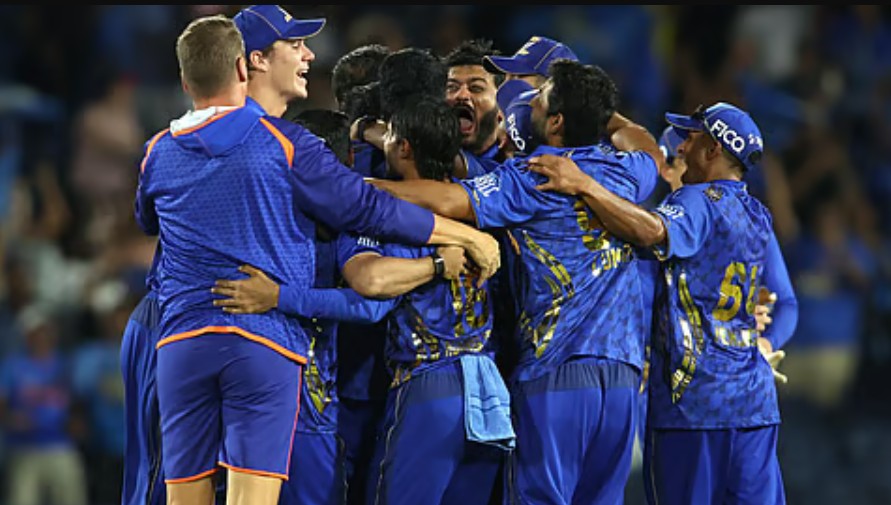It was all too familiar for fans of the blue-and-gold. Backed into a corner, written off early, and seemingly out of the playoff race, MI New York rose again — not just to compete, but to dominate. On Sunday night, they completed one of the most remarkable comebacks in franchise cricket history, lifting the trophy after a five-game winning streak.
This wasn’t just about individual brilliance. At the heart of it was a cultural reboot. Behind the scenes, head coach Mark Boucher was busy doing something far more transformative: embedding the core ethos of the Mumbai Indians — grit, composure, and ruthless winning instinct — into an entirely new generation.
From Chaos to Champion: MINY’s Revival
MI New York lost six of their first seven matches, a stretch that would bury most teams in a short-format league. But true to MI tradition, the turnaround was just beginning.
Talisman Kieron Pollard lightened the mood with some retail therapy in Miami malls, but the real change was internal — driven by belief, mindset, and culture. The team bounced back in stunning fashion, winning five straight (excluding one game where they rested seven players) to surge through the Miami leg and playoffs in Dallas.
The comeback wasn’t just improbable — it was surgical. Controlled, focused, and driven by clarity in leadership.
Boucher’s Cultural Reset
Mark Boucher, a veteran of South African cricket and known for his mental toughness, was under pressure. After a turbulent season with the Mumbai Indians in 2024, questions surrounded his tactical sharpness and man-management.
With MINY, he found his moment of redemption. More importantly, he laid the foundation for a longer-term vision. Boucher’s leadership wasn’t about reactive decisions — it was about cultivating ownership.
“It is time for the domestics to own this tournament through your performances,”
— Mark Boucher to his squad before the season began.
It wasn’t just talk. Boucher shifted the balance of responsibility away from overseas stars and empowered domestic players to lead.
Monank Patel: From Support Act to Lead Role
One of the biggest beneficiaries of this mindset shift was Monank Patel. Often overshadowed by more celebrated teammates, Patel had previously treated his role as an appetizer — steadying the top order before handing it over to the marquee hitters.
Under Boucher, that changed. He was given center stage and trusted with responsibility. The USA captain responded with 478 runs — the highest in the tournament — proving he could anchor and accelerate in equal measure.
He wasn’t just filling a role; he was defining the batting blueprint.
The Rise of Rushil Ugarkar
If Patel was the face of MI New York’s batting resurgence, Rushil Ugarkar became the poster boy for their bowling grit.
Just two years ago, Ugarkar didn’t bowl a single over in the Minor League Championship final on the same ground. Now, under Boucher’s watch, he defended 12 runs in the final over of a championship match — against Glenn Maxwell and Glenn Phillips, no less.
The 22-year-old, once seen as a filler, became a finisher.
“What I really enjoyed from the start is his attitude. He wants the ball in tough situations… That’s why he’s doing well now.”
— Boucher on Ugarkar before the final.
Offseason development with MI in the IPL helped, but it was belief — instilled by the coaching staff — that gave him the confidence to execute under pressure.
Tactical Clarity and Brave Calls
MINY’s resurgence wasn’t just emotional — it was tactical.
Rushil Ugarkar was chosen over the more experienced Ehsan Adil during crunch games.
Tajinder Singh Dhillon was preferred over Michael Bracewell for his tighter control and match-up suitability.
Dhillon responded with eight economical overs across the knockouts, including three high-pressure overs in the final — without conceding a single six.
These weren’t easy decisions, but they reflected a willingness to prioritize form over reputation, roles over resumes — the same philosophy that has defined MI’s success in the IPL for over a decade.
Pollard’s Milestone and MI’s Future
As Kieron Pollard completed his 700th T20 game and lifted his 18th trophy, he hinted at passing the baton.
“No way man! Will watch you guys play from beyond the boundary,”
— Pollard, when jokingly asked about reaching 1000 matches.
The transition may be gradual, but it’s happening. Young talents like Ugarkar are already building traditions of their own — including cheekily asking for Trent Boult’s shoes as souvenirs.
Boucher, in shaping this domestic core, is ensuring that even when legends like Pollard move on, the MI DNA remains intact — defined by hunger, humility, and an unbreakable will to win.
Conclusion
What Mark Boucher has started at MI New York is not just a comeback story — it’s a blueprint for the future. He has managed to silence critics, reestablish control, and build a bridge between the MI legacy and its next generation.
MINY’s trophy is more than just silverware. It’s a symbol of belief — belief in players who were once overlooked, belief in processes that take time, and belief in a culture where no game is lost until it truly is.
The gladiator spirit lives on, and Mark Boucher is the general leading this new battalion into the future — one that’s already learning to win the MI way.

